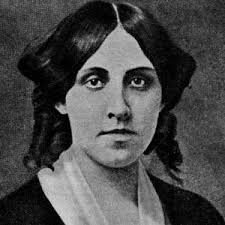
By Unknown author - Public Domain
Louisa May Alcott
Playwright
Biography
Louisa May Alcott
Louisa May Alcott was an American author. She was born on November 29, 1832, in Germantown, Pennsylvania, which has since been absorbed into the city of Philadelphia. When Alcott was two, her family moved to Boston, and because her parents were members of the transcendentalist movement, Alcott was family friends with and taught by literary greats such as Henry David Thoreau, Ralph Waldo Emerson, and Nathaniel Hawthorne. Alcott’s family was always impoverished, and because of that, she had to find whatever work she could. She often worked as a seamstress, teacher, or servant, but she was always writing. By the age of 19, Alcott was publishing poems, stories, and plays under the pseudonyms Flora Fairfield and A.M. Barnard.
In 1862, after the outbreak of the American Civil War, Alcott went to Washington, D.C., where she served as a nurse at Union Hospital. Halfway through her planned three month-long service, Alcott contracted typhoid and had to be sent home. Alcott continued to write, but it wasn’t until 1868 when she published the first part of Little Women that her work gained traction among the American public. Alcott’s publisher had asked her to write a story about and for girls, but all Alcott knew of girls were the experiences she had growing up with three sisters. Thus, Little Women became a semi-autobiographical piece, with Alcott writing herself as Jo, the teenage protagonist who believes her sisterhood to be falling apart when one of her sisters passes away from illness and the other two getting married. Alcott wrote two sequels to Little Women, Little Men in 1871 and Jo’s Boys in 1886. She did not relish in the fame that came with her literary prowess and often when fans would come to Alcott’s home, the Orchard House in Concord, Massachusetts (which is the setting of the original Little Women book), she would pretend to be a servant and tell the visitors that the author wasn’t home, just so that she would not have to accept the attention.
Alcott and her family were abolitionists, having befriended Frederick Douglas and providing their home as a stop on the Underground Railroad. Additionally, Alcott was a suffragette, and she lobbied for the town council of Concord to allow women to vote on matters related to education and domesticity. She was successful and she became the first woman to register to vote. However, she would not live to see the ratification of the Nineteenth Amendment, nationally guaranteeing women the right to vote. Alcott never married but after her youngest sister, Abigail May, died in 1879, Alcott became the guardian of her daughter, Louisa (named for Alcott), until her death due to a stroke on March 6, 1888, two days after the death of her father.
Shows
Shows associated with Louisa May Alcott
Songs
Songs from shows associated with Louisa May Alcott
Videos
Videos associated with Louisa May Alcott
Quizzes
Quizzes associated with Louisa May Alcott
Additional Information
Official website of Orchard House, the Alcott Family home and the setting of Little Women